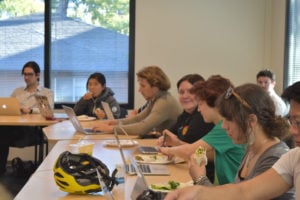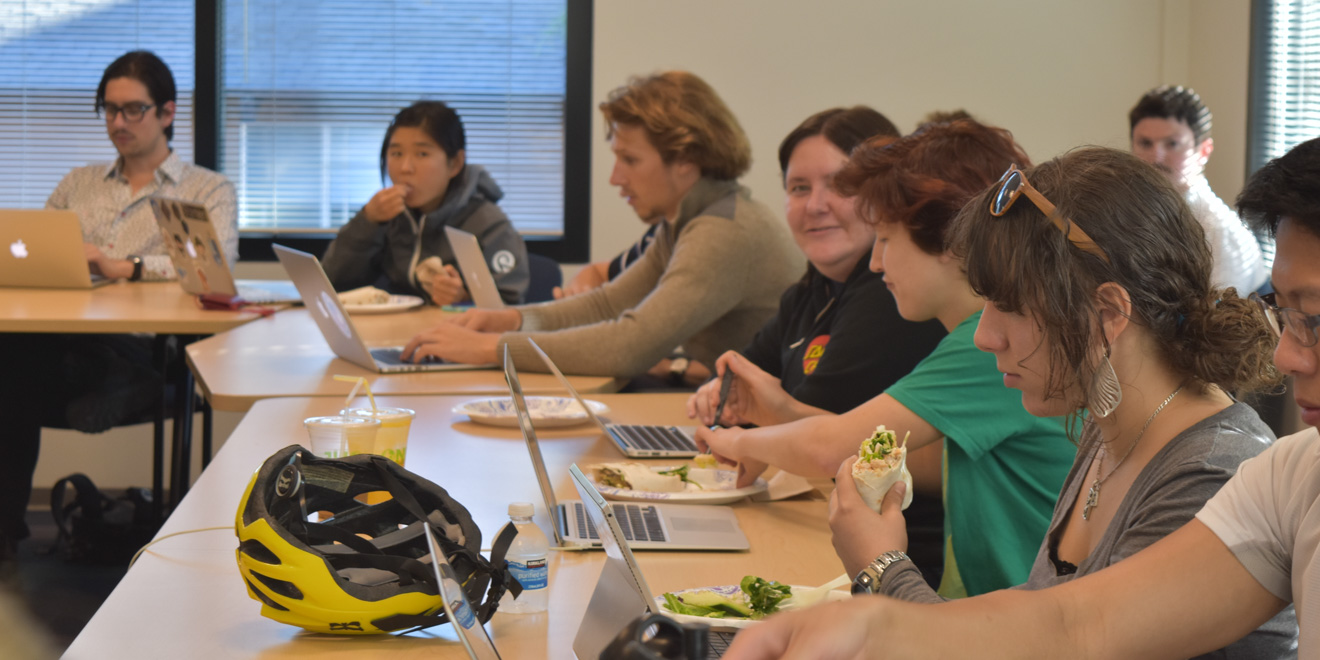
In its Wednesday meeting, the Graduate Student Council (GSC) brainstormed ideas for Stanford’s long-range planning process and saw updates from housing and an Undergraduate Senate bill to review Constitutional Council guidelines. Meanwhile, the GSC must consider what it must allocate parts of its budget to for the coming academic year.
Long-range planning
The GSC developed ideas to add to the long-range planning initiative, creating leadership roles in forming proposals for long-term change. Long-range planning, an initiative launched by Stanford President Marc Tessier-Lavigne and Provost Persis Drell, calls for student and faculty input to improve University policy over the next 10-15 years.
The brainstorm session, led by GSC proxy Kate Gasparro from the School of Civil Engineering, incorporated ideas from four sections that University administrators plan to improve: advancing education, expanding research, building community and reaching “beyond Stanford.” The goal was to establish a task force in each of the four areas to develop ideas for proposals.
Gasparro said that ideas thrown out that would not be fit for long-range planning could be tackled by the GSC next year and encouraged everyone to contribute.
“No idea is a bad idea,” Gasparro said.
Suggestions included a better Marguerite system and “Go Passes” for students to subsidize travel costs as a sustainable car-free initiative, increasing local greenery on campus, advising training for faculty, childcare for students and faculty with children, a communal graduate kitchen and increased engagement with local activism and schools.
GSC member Melanie Malinas, a Ph.D. candidate in biophysics, proposed empowerment for graduate students to speak for themselves when faculty advisors aren’t serving student needs. She also added that subsidized housing and increased research opportunities for undergraduates should be considered.
“It’s long-range planning,” Malinas said. “I’m dreaming big here.”
Proposals are due June 30, and individuals can submit as many proposals as they would like.
Graduate housing projects
GSC member Gabriela Badica from the Division of Literatures, Cultures and Languages updated the GSC on housing improvements discussed at the Graduate Housing Advising Committee (GHAC) last week, saying projects are at the “demolition and utilities” stage. According to Badica, this means that housing is working on tearing things down to rebuild safer and more accommodating houses, roads and parking areas.
Regarding last week’s controversy, Badica said that Residential and Dining Enterprises (R&DE) reached out to apologize for the short notice entry last week and to spark collaborative discussion of necessary policy changes after reading the GSC minutes and Daily article published last week.
The original plan to send a letter to GHAC and R&DE was overturned, as R&DE felt informed about the GSC’s intentions. R&DE and GHAC offered to come to GSC meetings and to work with council members on improving housing policy.
“They’ve always been really responsive and want to work with us on improving these policies,” Badica said.
Constitutional Council committee
Undergraduate Senators Gabe Rosen ’19 and Katie Hufker ’18 updated the GSC on a bill to create a joint committee with the Undergraduate Senate (UGS), GSC, ASSU Executive and Constitutional Council to review and restructure Constitutional Council operations. UGS passed the bill at their final meeting last Tuesday.
Rosen said the bill has arisen after the conflict around the LSJUMB/KZSU v. Undergraduate Senate case last winter, which led to discussions of censuring some Council members. These discussions were dropped.
These issues raised concerns over Council decision-making and procedure transparency within the student body as well as in the student government. Rosen said the goal of the committee would be to clarify what the Constitutional Council should rule going forward and to provide a sense of continuity as members of the Council graduate.
The joint committee would meet via video chat and email over the summer to develop ideas for improving guidelines and transparency.
“While recent memory is still very fresh from what’s going on, we really need to change structure going forward [by] codifying these rules while stakeholders are still around to do these certain things,” Rosen said.
Hufker, who represented the Band in the case and witnessed this conflict, said that the second case this spring over the appointment of Lizzie Ford ’20 to Senate went “much smoother” after issues regarding Council rulings were discussed openly in the student government body.
GSC member Isa Rosa M.S. ’16 from the Graduate School of Engineering was also present at the LSJUMB/KZSU v. Undergraduate Senate proceedings and said that this joint committee would be beneficial in making the affairs of the Constitutional Council more transparent. Rosa also noted that it is unusual for the Council to hear two cases in a year, and that there are many years when it doesn’t hear any.
“We need to create a formal definition of what the Constitutional Council is,” Rosa said. “The Constitutional Council is missing that at the moment.”
Financial issues
The GSC rehashed issues regarding funding committee guidelines despite the expedited process at the meeting this week.
Questions regarding the funding approval process were continued from the previous two weeks’ discussions about changing guidelines.
Rosa and Malinas, funding committee co-chairs, said that the process is already smoother, as demonstrated by the quicker and more transparent approval of all the funding committee requests this week.
GSC Financial Officer Dan Walls, a Ph.D. candidate in chemical engineering, said that Voluntary Student Organization (VSO) officers should not be required to attend GSC meetings.
Rosa and Malinas said they would prefer that the VSO financial officers come to the GSC meetings to make funding decisions transparent and to have a second set of eyes on decisions.
Former GSC Co-Chair Terence Theisen from the School of Medicine echoed this position, saying that having the financial officers come to meetings also makes the GSC proceedings more open and available to the public.
“It forces at least one person to see that the GSC is here and what we do,” Theisen said. “It creates that personal connection with at least that one person who is here.”
These funding committee questions arise as the GSC ponders spending for social events from its reserve funds. Although funds are healthy now, they might not be later, advised Stanford Student Enterprises (SSE) assistant financial manager Luka Fatuesi ’17.
The GSC hosts social events for the graduate community each year, according to Badica, who serves as GSC social chair.
Fatuesi says the GSC differs from UGS with regards to hosting these events. Fatuesi says that the ASSU and SSE hope to “harmonize” GSC and UGS next year with regards to funding and working collaboratively.
Special fees for student groups cover large events, and UGS relies on student groups to host events without hosting any itself. Badica said she worries about cutting funding for social events, especially for the graduate community.
“It’s not the only way to combat isolation, but it is one way,” Badica said, referring to GSC-sponsored events.
The GSC will need to look over the budget for the coming year to determine if cutting some funding for social events will be necessary.
Contact Gillian Brassil at gbrassil ‘at’ stanford.edu.
